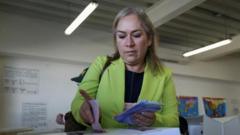In a historic first for Mexico's judicial system, Silvia Delgado, a former defense lawyer for Joaquín "El Chapo" Guzmán, was elected as a local criminal judge in Ciudad Juárez, a result that has raised eyebrows and sparked debate regarding the integrity of legal professions within the political arena.
El Chapo's Former Lawyer Breaks New Ground as Elected Judge in Mexico

El Chapo's Former Lawyer Breaks New Ground as Elected Judge in Mexico
Silvia Delgado, previously known for defending drug lord El Chapo, triumphs in judicial elections amidst controversy.
In a transformative step for Mexico's judiciary, Silvia Delgado, who was part of the counsels defending the notorious drug lord El Chapo, achieved a notable victory by winning a position as a local criminal judge on the US-Mexico border. The elections, held on June 1, marked the country's inaugural move towards electing judges, a shift aimed at enhancing democratic accountability within the judiciary. Delgado's candidacy was contentious, with accusations from a transparency group claiming she had connections to organized crime—a notion she fervently contested, asserting her role was strictly as a legal defender.
Delgado, aged 51, was involved in El Chapo’s defense until his 2017 extradition to the United States, where he was later convicted of drug trafficking and sentenced to life imprisonment. In an interview prior to the election, she articulated her belief in the right to legal counsel for all, including high-profile criminals. Following the election, she chose to withhold further comments until her victory was officially confirmed.
The judicial election stood out as the first following substantial reforms initiated by the Morena party, with advocates claiming that electing judges via direct votes would render the judiciary more democratic. Despite these claims, the election drew criticism for potentially jeopardizing judicial independence, and a turnout of just 13%—the lowest in federal voting history—reflected a lack of enthusiasm among the electorate regarding this new electoral process. Nonetheless, President Claudia Sheinbaum hailed the event as a major success for enhancing the democratic fabric of Mexico's justice system.
Delgado, aged 51, was involved in El Chapo’s defense until his 2017 extradition to the United States, where he was later convicted of drug trafficking and sentenced to life imprisonment. In an interview prior to the election, she articulated her belief in the right to legal counsel for all, including high-profile criminals. Following the election, she chose to withhold further comments until her victory was officially confirmed.
The judicial election stood out as the first following substantial reforms initiated by the Morena party, with advocates claiming that electing judges via direct votes would render the judiciary more democratic. Despite these claims, the election drew criticism for potentially jeopardizing judicial independence, and a turnout of just 13%—the lowest in federal voting history—reflected a lack of enthusiasm among the electorate regarding this new electoral process. Nonetheless, President Claudia Sheinbaum hailed the event as a major success for enhancing the democratic fabric of Mexico's justice system.



















